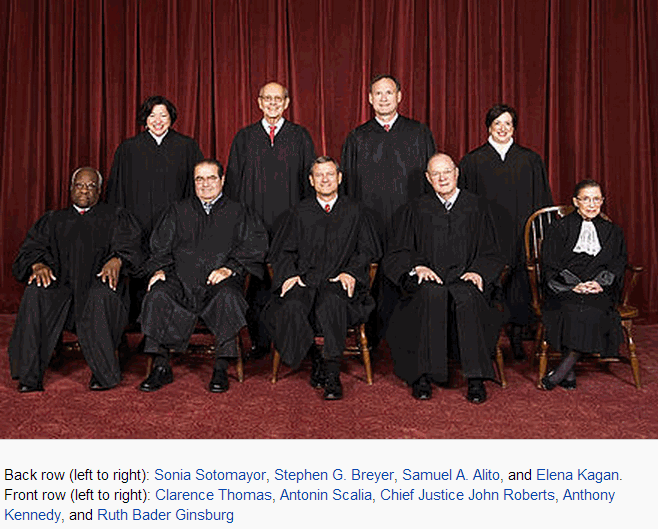|
News & Views item - June
2013 |
 US Supreme Court Rules Unmodified
Human Genes Cannot be Patented. (June 14, 2013)
US Supreme Court Rules Unmodified
Human Genes Cannot be Patented. (June 14, 2013)
The US Supreme Court (9-0) has ruled that companies cannot patent human genes.
The ruling overturns Myriad Genetics patent on genes with links to breast and
ovarian cancer. The court has however upheld the ruling that synthetically
created exons-only strands of nucleotides known as composite DNA (cDNA) are
patentable. The ruling found that “A naturally occurring DNA segment is a
product of nature and not patent eligible merely because it has been isolated,
but cDNA is patent eligible because it is not naturally occurring” (see
pages 16-17 of the rulling)*.
The nine justices of the US Supreme Court

Eliot Marshall and Michael Price writing in
ScienceInsider note: "The impact of the decision
on other companies may depend on exactly how gene patent claims are worded.
While the court ruled out "natural" DNA patents, it also permitted cDNA patents.
Although 'cDNA retains the naturally occurring exons of DNA … it is distinct
from the DNA from which it was derived,' the court wrote. 'As a result, cDNA is
not a 'product of nature' and is patent eligible.'"
Francis Collins, director of the National Institutes of Health, said today:
"Our position all along has been that patenting DNA in its natural state does
not provide any benefit to the public. There have been concerns that you might
have a $1000 genome sequence, but a $500,000 royalty fee to use it. We can
breathe a big sigh of relief that this will no longer threaten to inhibit the
progress of DNA research."
____________________________
On the local Australian scene Dr Luigi Palombi, a patent lawyer and author
of ‘Gene Cartels: Biotech Patents in the Age of Free Trade’ as well as an
academic at the Centre for the Governance of Knowledge and Development at The
Australian National University viewed: This decision is to be welcomed. It
removes 30 years of uncertainty over the patenting of biological materials
existing in nature and deals a blow to the semantics over the word 'isolated'.
According to the Court merely isolating genetic material from the human body
does not render the genetic material patentable subject matter. The Court also
make it clear that while cDNA is patentable subject matter, if the genetic
sequence housed in the cDNA is "indistinguishable" from the information in the
natural DNA, that cDNA is also not patentable subject matter. In other words,
before genetic material is patentable the genetic sequence housed in that
material must be distinguishable from what exists in nature.
While Professor Ian Olver, CEO of the Cancer Council said: This is a welcome
decision that addresses the issue of commercial monopolies over genetic
mutations that are vital to cancer prevention, diagnosis and treatment. If there
had been greater clarity on the issue back in 2008, the Australian licensee for
the BRCA1 and BRCA2 patents would not have been able to demand public
laboratories cease conducting the tests. Eventually the patent enforcement claim
was withdrawn, but there was, and still is, nothing in Australian law to prevent
commercial interests trying to monopolise the use of genetic materials.
The US Supreme Court’s ruling paves the way for
Australia’s federal parliament to change the Patents Act and clarify that human
genetic materials are not inventions and are not patentable. We welcome
innovation in medical research, which should rewarded by a robust patents
system. However, discovery and isolating genetic material is not innovation. The
US Supreme Court’s decision is a landmark ruling that provides a clear precedent
for Australia.
__________________________________________
*The full ruling of the court is
available here.
![]() US Supreme Court Rules Unmodified
Human Genes Cannot be Patented. (June 14, 2013)
US Supreme Court Rules Unmodified
Human Genes Cannot be Patented. (June 14, 2013)
![]()